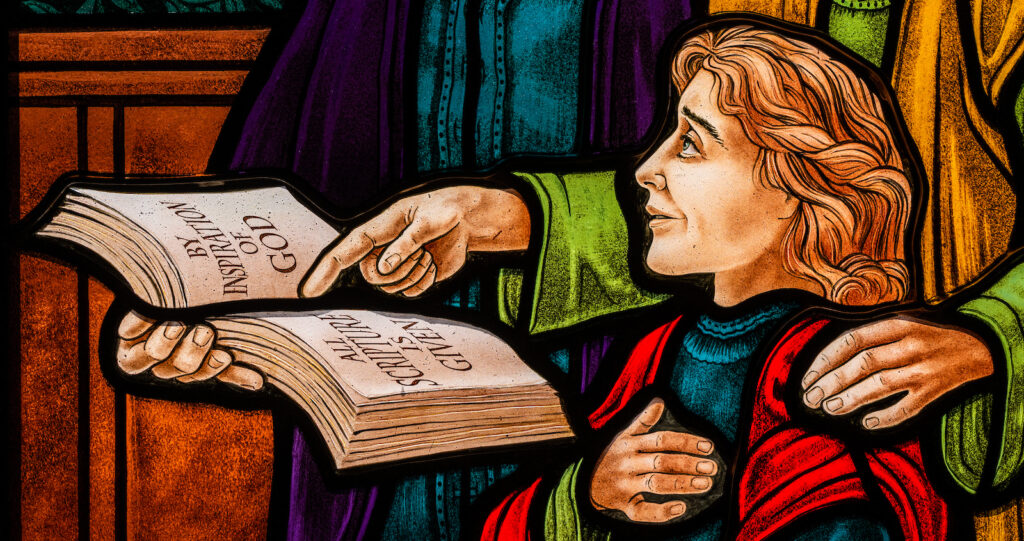by Matthew C. Harrison
Dear Brothers and Sisters in Christ,
The Lutheran Book of Concord is a treasure. But if its content is not living and lived, it’s only an old book. As I’ve noted, our Confessions are entirely concerned with the Gospel of free forgiveness in Christ, offering certainty regarding the Gospel and the great comfort and consolation of the consciences of believers. In fact, the word “conscience” appears on almost every other page. Because religion is, above all, a matter of conscience, and especially a matter of good conscience, the Book of Concord delivers the certainty of God’s love in Christ by teaching about justification by grace through faith and the delivery of forgiveness in the Word proclaimed and read, in absolution, in Holy Baptism and in the Lord’s Supper.
Our LCMS holds a “quia subscription” to the Book of Concord. That means we subscribe to the Confessions because (quia) they are a faithful exposition of God’s Word, not merely insofar as they contain the Word of God. And so all of our churches, all of our pastors, teachers and workers swear not to depart from the Lutheran Confessions. All of our confirmands and laity vow to uphold this Lutheran faith, most simply known and confessed in Luther’s Small Catechism. A pastor, a congregation, even a church member may be removed for attacking the teachings of the Book of Concord. Why? This book confesses the truth as it is given in God’s Word. And that truth of the Gospel is the greatest gift and consolation in the world. I won’t be part of a church that can willy-nilly yank biblical certainty away from me or my loved ones based on a single pastor’s varying predilections. I want a pastor and a congregation sworn to uphold the truth of the Scriptures, and that means the truth of the scriptural assertions of the Book of Concord.
Dr. C.F.W. Walther wrote extensively about this:
Is it fully in accord with the spirit of our Symbols to demand an unconditional subscription of the servants of our Church? I respond: There can be absolutely no doubt about this. The Conclusion of the Augsburg Confession reads: “Only those things have been recounted whereof we thought that it was necessary to speak, in order that it might be understood that in doctrine and in ceremonies nothing has been received on our part against Scripture or the Church Catholic” ([Augsburg Confession, Conclusion 4&5;] Triglotta, 95). The same thought is stated in the Foreword to the Formula of Concord regarding the Augsburg Confession: “To this Christian Augsburg Confession, so thoroughly grounded in God’s Word, we herewith pledge ourselves again from our inmost hearts; we abide by its simple, clear, and unadulterated meaning as the words convey it, and regard the said Confession as a pure Christian symbol, with which at the present time true Christians ought to be found next to God’s Word; just as in former times concerning certain great controversies that had arisen in the Church of God, symbols and confessions were proposed, to which the pure teachers and hearers at that time pledged themselves with heart and mouth. We intend also, by the grace of the Almighty, faithfully to abide until our end by this Christian Confession, mentioned several times, as it was delivered in the year 1530 to the Emperor Charles V; and it is our purpose, neither in this nor in any other writing, to recede in the least … from the oft-cited Confession, nor to propose another or new confession” (Triglotta, 847; “Introduction to the Formula of Concord”). (In the Latin original it says … not to depart even a finger’s breadth.) The same thing is expressed in the Preface to the Book of Concord also of the other previous Symbols, regarding the Ecumenical Creeds, the Augsburg Confession, its Apology, the Smalcald Articles, and both catechisms, when it says there: “Therefore we also have determined not to depart even a finger’s breadth … either from the subjects themselves or from the phrases which are found in them … but, the Spirit of the Lord aiding us, to persevere constantly, with the greatest harmony, in this godly agreement, and we intend to examine all controversies according to this true norm and declaration of the pure doctrine.” (Triglotta, 23)
Finally, the Formula of Concord designates all the previous Lutheran Confessions as “a unanimously accepted, definite, common form of doctrine, which all our evangelical churches together and in common confess, from and according to which, because [not insofar as] it has been derived from God’s Word, all other writings should be judged and adjusted as to how far they are to be approved and accepted” (Triglotta, 855; FC SD Rule and Norm 10).
All these quotations clearly show that our Symbols themselves demand an unconditional subscription, and he who wants to subscribe conditionally denies what the Symbols themselves demand.
C.F.W. Walther, “Answer to the Question, ‘Why Should Our Pastors, Teachers, and Professors Subscribe Unconditionally to the Symbolical Writings of Our Church?'” trans. A.W.C. Guebert, Matthew C. Harrison in At Home in the House of My Fathers (St. Louis: Concordia Publishing House, 2011), 131–32. Emphasis added. Reprinted with permission.
Thanks be to God for generations of Lutherans who have held fast to these Lutheran Confessions and to the truth of God’s Word that they articulate so clearly. Thanks be to God for the pastors, congregations and church members across our dear Synod who continue to hold them fast and to live in them. Thanks be to God for our confessing church.
–Pastor Matt Harrison






